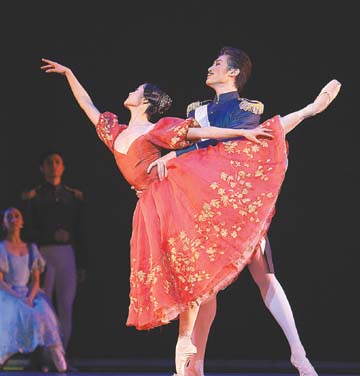|

National Ballet of China (NBC), one of the most prestigious ballet theaters in the world, will perform “Onegin” between Nov. 4 and 6 at Shenzhen Grand Theater.Debra Li
A CLASSIC of both symphonic ballet and theatric ballet, “Onegin” combines the genius of author Alexander Sergeyevich Pushkin, musician Tchaikovsky and choreographer John Cranko.
National Ballet of China (NBC), one of the most prestigious ballet theaters in the world, will perform the ballet between Nov. 4 and 6 at Shenzhen Grand Theater.
The verse-novel by Pushkin is a classic of Russian literature, and its eponymous protagonist has served as the model for a number of Russian literary heroes called superfluous men. These men lived in the first half of the 19th century, and were well-educated and inherited fortunes from their families. However, they were unhappy social misfits.
Eugene Onegin is a bored St. Petersburg dandy who inherits a landed estate from his uncle. When he moves to the country, he strikes up a friendship with his neighbor Vladimir Lensky. One day, Lensky takes Onegin to dine with the family of his fiancee, the attractive, extroverted and rather vacuous Olga Larina.
At this meeting he also catches a glimpse of Olga’s sister Tatyana, a quiet and romantic young lady. Tatyana falls in love with Onegin and writes him a letter declaring her feelings. Unexpectedly, Onegin rejects her.
Later, at a party, Onegin is irritated with guests for gossiping about him and Tatyana, and with Lensky for persuading him to come. He decides to get revenge by dancing and flirting with Olga. Lensky, feeling hurt, challenges Onegin to a duel. At the duel, Onegin kills Lensky, expressing his sorrow afterwards. Onegin then leaves, choosing travel as a means of getting over his remorse.
Years later, when Onegin has come to attend the most prominent ball in Moscow, he sees the most beautiful woman who now captures the attention of all, and he realizes that it is Tatyana whose love he had turned away. She is married to an aged general. He tries to win her affection by writing her letters but receives no reply. When Onegin manages to see Tatyana to express his love, Tatyana rejects him. She admits both her love for him and absolute loyalty to her husband.
Moved by Pushkin’s verse, Tchaikovsky created an opera based on “Onegin.” The music vividly represents Onegin’s apathy and Tatyana’s self-control.
Founder of Stuttgart Ballet and choreographer John Cranko adapted the masterpiece into a ballet in 1965. “Onegin” is the most influential of his works. Cranko’s gift for nuanced story-telling, clear dramatic structure and his exquisite mastery of the art of the pas de deux conquered New York audiences during a triumphant season at the Metropolitan Opera in 1969. Worldwide acclaim soon followed, as Cranko and his young company toured the globe.
Also noteworthy is the work of German composer Kurt-Heinz Stolze who arranged and orchestrated the ballet music. Stolze used the music of Tchaikovsky, but not a note from his opera of the same name. Instead, he orchestrated some little-known piano works by Tchaikovsky such as “The Seasons” and part of the symphonic fantasia “Francesca da Rimini.”
NBC debuted “Onegin” in December 2008 in Beijing. Four designers from Germany and Britain were commissioned to do the costumes and stage design to give the show a modern touch. Very different from classical ballet such as “Swan Lake,” the stage set and illumination for “Onegin” are so fresh that audiences will almost be able to smell the birch woods of Russia.
The theater has also invited Beijing University Professor Kong Qingdong to lecture the dancers on Russian literature.
“It took some time to gain the copyright for ‘Onegin,’” said NBC President Feng Ying. “Stuttgart Ballet required us to first purchase ‘Romeo and Juliette’ as a test for our proficiency. Our version of ‘Romeo and Juliette’ far exceeded their expectations, and they willingly sold us the copyright for ‘Onegin.’”
This year’s winner of the 19th Benois de la Danse Female Dancer of the Year award, Zhu Yan will lead in “Onegin.” She said her team very much enjoyed the show.
“It’s not a classical work, therefore it leaves more room for us to interpret. Unlike ‘Swan Lake’ or ‘Sleeping Beauty,’ ‘Onegin’ is set in the real world. It has drama, tension and complex psychology. Both leading and supporting dancers in the show enjoy performing it very much,” she said.
“It is like performing in a drama using ballet. The audience has a lot to watch for: stage set, solo, duo and group dances, and of course the music.”
Time: 8 p.m., Nov. 4-6
Venue: Shenzhen Grand Theater
Tickets: 180-880 yuan
Hotline: 8246-8833, 8352-3626
|

